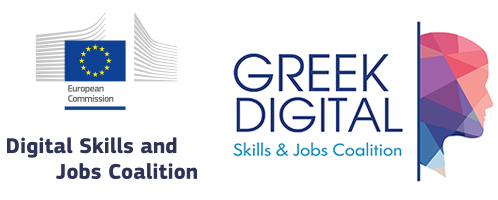

We all realize that constant acquiring of new skills paves the way to employment and prosperity. As long as we possess the right skills, we are in the position not only to claim better jobs, but also to effectively play our role as active citizens in a democratic society.
The 4th Industrial Revolution urgently brings this need at the forefront of public debate. In order to respond to the challenges of the digital era, it becomes necessary to invest in training our human resources with enhanced digital skills. In this way, we as a society will be in the position not only to gain competitive advantages, but also to promote knowledge and innovation.
Heeding the requirements of our times and within the context of the Europe 2020 strategy, the European Commission has adopted the policy of “A new Skills Agenda for Europe. As of June 2016, the EU Digital Skills and Jobs Coalition consists one of ten key actions of the European policy mentioned above.
The policy’s objective is to promote and facilitate, on a pan-European level, the cooperation between member states, private and public sector entities, various social partners, non-governmental organizations, education and training institutions and more generally all publicly active entities, in order to tackle what is known as the “digital gap” in Europe.
As part of this initiative and with a view to developing and enhancing the cooperation between the bodies involved in each member state, there have been established national and regional coalitions in the majority of the member states. Accordingly, in May 2018 the National Digital Skills and Jobs Coalition was established in Greece
The Greek National Coalition for Digital Skills and Jobs is a cooperation platform between various entities, public or otherwise, which seek to promote digital skills in Greek society.
Objectives of the National Coalition are:
To achieve the above objectives and in accordance with the European Commission’s Digital Skills and Jobs Coalition, the following four (4) groups have been established
Education: Enrichment and digital transformation of the learning and teaching process for pupils and students. Integral part of this effort is the provision of incentives for the continuing training of teachers.
Training: Development of digital skills of employees, unemployed and businessmen in order to promote digital economy.
Information and Communications Technology Professionals: Promotion of high-level digital skills for ICT professionals in all industry sectors.
Citizens: The objective is to enhance digital skills to enable all citizens to be active in our digital society.
Alongside the above groups operates the horizontal Funding and Communications Group which seeks ways of funding and communicating their actions.